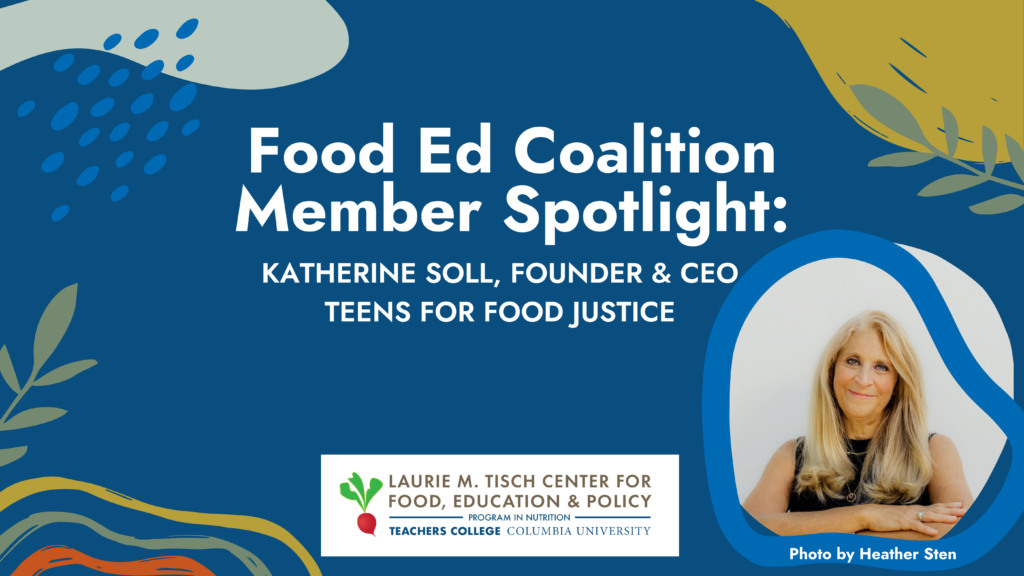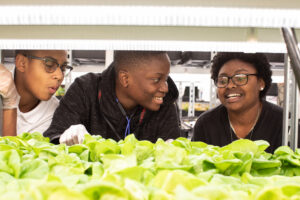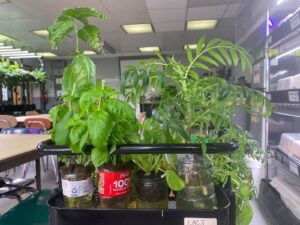An interview with Katherine Soll, Founder and CEO of Teens for Food Justice
By Stephanie Loui | Published March 28, 2023
The Food Ed Coalition Spotlight Series highlights people and organizations doing amazing work in food education and access in NYC. Find more from the series on the Food Ed Hub.
Interview with Kathy Soll, Founder and CEO of Teens for Food Justice.
Quotes have been edited for length and clarity.
What led you to start Teens For Food Justice (TFFJ)?
The backstory behind the creation of Teens for Food Justice is that one of our co-founders, now board member, Chana Chenfeld and I started an organization called Students for Service in 2010, which was focused on the idea of providing community service opportunities for New York City’s middle school and high school students that actually engaged them in talking about and acting upon social justice inequities in our city.
Our students were uniquely concerned with the issue of food insecurity and how a city with food resources that are so vast in some areas could also have such limited resources in others, and how in a city so rich in food, there could be people who have such lack of access to food at all”
I’m a born and raised New Yorker and really committed to New York and grew up in a time where there was a great deal of activism. It felt like that was something that had faded from the scene and the city had become more siloed and segregated, particularly in our schools, and we were really looking for a way to bring kids together from across the New York City’s demographics to look at these problems collectively and see how they could be agents for change. We engaged about 1000 teens in service projects. It was a lot of work with food pantries and soup kitchens, rescue work during Hurricane Sandy, work in the schools. And what we found was that our students were uniquely concerned with the issue of food insecurity and how a city with food resources that are so vast in some areas could also have such limited resources in others, and how in a city so rich in food, there could be people who have such lack of access to food at all as well as healthy food and the economic underpinnings of that. Our Board Chair, Tara Swibel, joined the organization and brought with her a real interest in hydroponics, regenerative farming, and a perspective to really upend the way that we grow food.
We merged these ideas and created TFFJ to give us the opportunity to alter and upend our food system and make healthy food available equitably and affordably, in the communities that need it most while also educating students in cutting edge agricultural techniques through their school experience, as well as an understanding of advocacy for universal health and nutrition availability that could impact people’s health outcomes. So that’s how the organization was founded. It was the merging of these ideas that came out of what the students themselves were really concerned about. That is really why we are called Teens for Food Justice, because we are rooted in a youth-led, community-based movement, where we are empowering a generation to make the change that they want to see. And I think that can give us all hope.
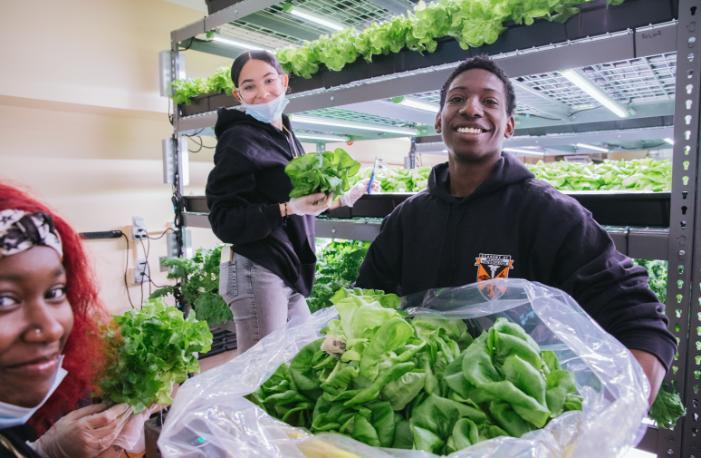
What impact or skills, behaviors, or knowledge do you hope TFFJ offers to the community?
We hope to provide the community with a full understanding of the policies and processes that are rooted systemically in our approach to food and how that’s tied into housing, and systemic racism, political agency- it’s all interconnected and relies on having the tools to really make changes at all levels. That includes the ability to be the entrepreneurs, or the leaders in a new type of workforce that has the capacity to look beyond conventional agriculture, and to drive us towards these new growing techniques that are happening. We’re running out of water, there are tremendous issues with our land use, with petroleum-based fertilizers and pesticides, and our transit system logistics for moving food around. It’s about empowering communities to have that food sovereignty, to be able to take over the production of food, to determine what kind of food they want to have in their community, create local distribution networks that make food available affordably, within communities, and to change how food is priced, so that inexpensive food isn’t unhealthy food. That requires knowing and having the technological skills, the interpersonal skills, the entrepreneurial skills, the workforce development skills, the understanding of nutrition and its impacts on health. And it also involves an ability to utilize the tools to speak to this change and to mobilize others to be a part of that. It’s really a wraparound approach.
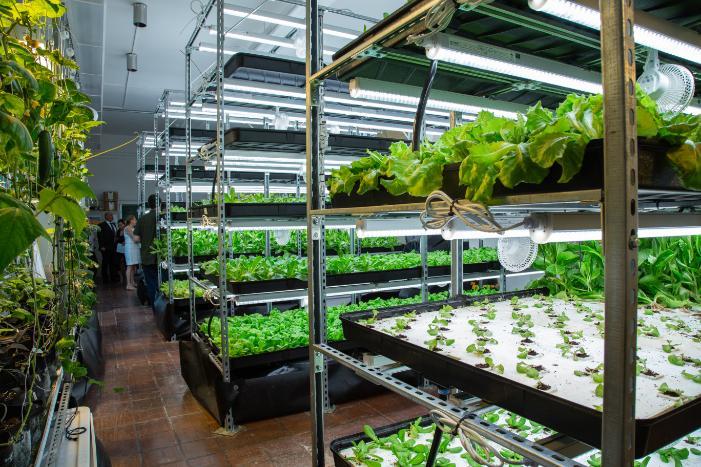
Tell us about one of your favorite TFFJ program activities and why it’s your favorite?
Last year we worked with our students to actually incorporate food that we grow into meals, particularly meals that are healthy and culturally-relevant, so that not only are they learning how to make some of the meals that they have eaten historically within their families in a healthier way, but also incorporating more plant-based foods into those recipes. They are then sharing that food with others in the community. That for me is a particularly resonant activity that we do, because it enables the students to really talk about and share culturally-relevant foods, purchasing ingredients that are reflective of that heritage, specifically affordable and local to them.
Another activity that I think is amazing started with students at our DeWitt Clinton campus. Students decided that they wanted to push back at the vegan menu options that were being offered at school lunch, the plant-based options that they didn’t think were delicious. And they really wanted to make a statement about that. They worked with the cafeteria staff at that campus to create a ramen bar that featured different produce that they were growing on the farm. They worked with the staff to purchase ingredients for the noodles, to make the sauce, to incorporate the bok choi and Thai basil and some of the other ingredients from the farm into the recipe, and then they were in the cafeteria helping to hand food out to the students. The response was just amazing and the students felt so powerful in having done that. But I think that another piece of it that was so important was that they actually collaborated with the school system, with the cafeteria staff, to make this happen, because everyone felt that there can and should be better options that are tastier and more flavorful. And let me also say that in putting the activity together, the students stuck with the per capita spend per student for school lunch. So you know, they came to understand the struggle that you have as a school system to feed children every day on the kind of budget that’s allocated in a healthy way.
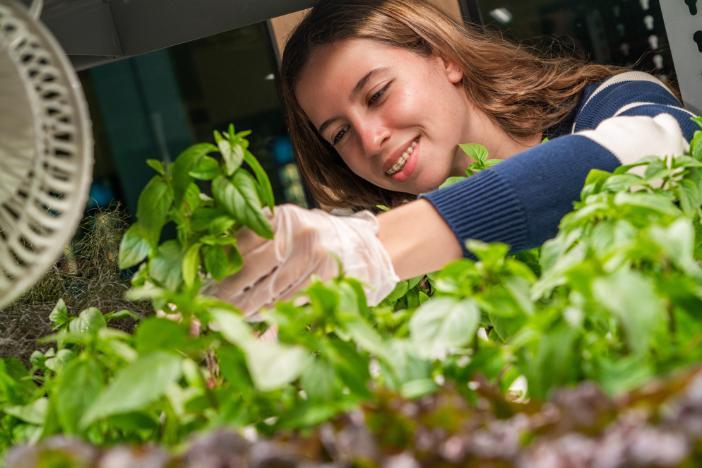
At the DeWitt Clinton campus, we grow 10,000 pounds of produce per year. All of our farms are designed to grow somewhere in the neighborhood of about 6,000 to 10,000 pounds of produce per year. And we are giving over 100 to 200 pounds of produce to the cafeteria on a weekly basis as well as distributing to multiple community-based partners and also providing campus-wide distributions to students and their families, teachers, etc. Lettuce from the farm is incorporated in the salad bar in the cafeteria on a daily basis. And that is true across all of our sites. And so students are eating food that’s from the farm every day if they choose the salad bar.
There is no reason that we should not be providing healthy, quality meals to all of the children who attend our schools so that they are primed to learn and function at their highest level and not be hungry during the school day, particularly, because so many kids receive their healthiest and sometimes only meals of the day in school.”
What food issue should people be paying attention to right now?
A key food issue that people need to be paying attention to right now is universal school meals. It’s just so important that all children be able to go to school and eat breakfast and lunch at no cost. It’s critical that children have access to healthy food every single day. There is no reason that we should not be providing healthy meals, healthy, quality meals to all of the children who attend our schools so that they are primed to learn and function at their highest level and not be hungry during the school day, particularly, because so many kids receive their healthiest and sometimes only meals of the day in school. it should be available to everyone. And certainly breakfast in the classroom. We should just come to that understanding. Then there’s ensuring that SNAP and WIC benefits are not cut, that they rise with the cost of living, all of these things are just so critical.
How can people support your work right now?
We’re a 501(c)(3), not for profit, your donations keep us going and will continue to support our programming and enable us to grow, thrive and expand and to bring this work to more communities and more students. Another way to support us is to elevate our messaging and follow us on social media. Talk about us to local elected officials, particularly here in New York, because there’s so much interest in this kind of work right now. The more awareness that we can raise about the work that we’re doing, the more impact we can have.
To read more about TFFJ, check out these recent features:
BK Reader: Brooklyn Teens Address Food Insecurity, Nutrition Education in Schools
CivilEats: Hydroponics Help Urban Schools Grow Food Year-Round
— Stephanie Loui
Find the original piece here on Tisch Food Center: The Food Ed Hub.

